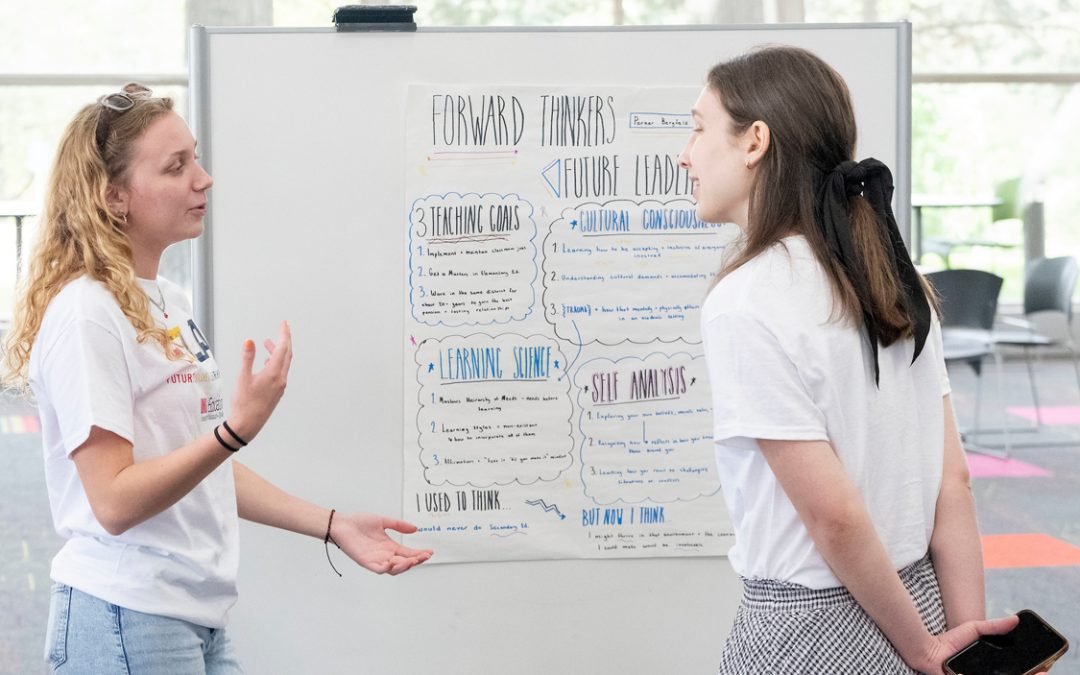
Dani Pizzella examined the effectiveness of asynchronous remote training in behavior analysis for her dissertation. She was finishing her research at the onset of the COVID-19 pandemic and had to adjust her methodology, which initially relied on trained actors. Instead, she taught parents and significant others how to act in training simulations over Zoom. (Photo courtesy of Dani Pizzella)
Dani Pizzella is not a drama teacher nor a director, but she spent this past summer coaching boyfriends, roommates and parents how to act like distressed children.
Rather, she is a special education administrator and two-time graduate of the University of Missouri–St. Louis College of Education. The peculiar task was part of her PhD dissertation about the efficacy of teaching behavior management techniques remotely.
Initially, the plan was to teach the techniques to her research subjects with the help of trained actors. The onset of the COVID-19 pandemic made it impractical for the subjects and actors to meet in-person and interact. Pizzella had to adapt quickly and develop a plan B, which led to her part-time stint as a director.
Still, she successfully defended her dissertation and earned her doctorate in education while still working a full-time job and as an adjunct instructor at UMSL.
Though her career started on different path entirely.
Pizzella studied communications and environmental sciences as an undergraduate at Webster University, but she wasn’t passionate about the work. She became drawn to the idea of pursuing special education through her previous experiences as a nanny.
“I had done some work nannying for kids with disabilities,” Pizzella said. “It was something I had grown up around, so I was really comfortable with it.”
UMSL’s special education program and opportunities for specialized training convinced her to attend the university for her MEd.
“When I had met with Dr. Patricia Kopetz, she was talking about starting a behavior analysis program through the College of Education,” Pizzella said. “I wanted to do that, and UMSL was starting a program, so I was really interested.”
The concept is something Pizzella came across while working with children with disabilities. Applied behavior analysis is a set of principles that serve as a basis for studying and managing behaviors through individualized interventions.
It can be especially useful for special educators to create positive learning environments for all students. In practice, Pizzella explained that a teacher might break a project into small, measurable steps to make things manageable for students. It also helps the teacher better observe at what point to step in if a task becomes too difficult or frustrating.
Pizzella finished her master’s and stayed to complete the behavior analysis coursework, becoming the first board certified behavior analyst to complete their course work through UMSL. But she still wanted to build upon her expertise.
“I wanted to go a little bit further and get more of a background in research,” she said. “I currently work for a special school district, and I’m an administrator for the behavior analysis division. I wanted to find a way to incorporate behavior analysis into the teacher preparation programs for special education teachers, so that they can have better classroom behavior management.”
It led her to enter the PhD program in teaching and learning processes at UMSL. Her dissertation, “A Comparison of the Effectiveness, Efficiency, and Post-Training Outcomes of Traditional Behavioral Skills Training and Asynchronous Remote Training,” compared asynchronous remote training in behavior analysis to traditional, face-to-face training.
The idea was to examine whether asynchronous remote training – instruction that doesn’t happen in the same place or time – could be equally effective, thus making it more accessible.
She started her research with two groups, an in-person training group and an asynchronous remote training group. The members of the remote group received their training instructions from a video Pizzella recorded for them. However, they were still set to meet with actors on campus, so they could practice interventions with another person during evaluations.
“I had finished the in-person group thankfully and was working on the remote group when everything shut down,” she said. “I had to modify what I was doing with my dissertation so the remote training group wouldn’t be practicing with an actor in a conference room at UMSL, but they would be practicing with someone within their own home.”
She was able to pivot and teach parents and significant others how to act in training simulations over Zoom. Despite the challenge, it actually proved more insightful than anticipated.
The training sessions and the recorded assessments sent back to Pizzella for review were a window into what actually happens in the home. They illustrated the realities of what parents of an autistic child might face while trying to apply behavior analysis lessons.
There were other positives, as well. The results showed that in-person and remote training were equally effective. Remote training was also incredibly efficient.
“The in-person training, I had to repeat each time with each participant, but to do it with the remote group, I only had to record myself once,” Pizzella said. “So, it’s exponentially more efficient the more people that watch the training video.”
In light of her findings, Pizzella is optimistic about behavior analysis becoming more widespread in homes and schools through asynchronous remote training. She noted that there is a shortage of behavior analysts in the United States – most being concentrated in urban centers. This approach could greatly benefit parents and teachers in more isolated rural areas who sometimes drive upward of three hours to meet with a professional for training.
Eventually, Pizzella hopes to expand her research internationally, as well.
“The idea was to make behavior analysis more accessible,” Pizzella said. “I’ve gotten training requests from young women in China, who want to learn more about behavior analysis. But if I’m talking to someone in Beijing, there’s a 12-hour time difference. One of us is trying to meet at a very inconvenient time for the other person. You’d have to be doing things a little more asynchronously. It allows for the flexibility behavior analysts need to be able to see more people.”
Luckily, it’s less demanding than ever to connect with someone halfway across the country or the globe.
“The coolest part about this is that it’s super easy to do,” she said. “You need a cell phone and a little bit of time. It’s not super invasive. You don’t need expensive products or anything like that. You need the things that we already have, which is part of what makes it awesome.”














